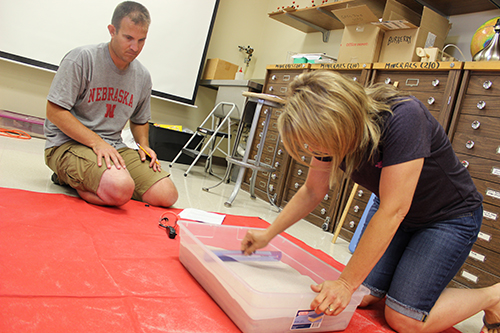
Are you interested in professional development this summer? Register for one of the Nebraska Math and Science Summer Institutes’ graduate courses for science teachers at the University of Nebraska-Lincoln this summer and earn 3 graduate credits in just one week!
During the months of June and July, several courses are available to provide a superb opportunity to deepen your knowledge of science and the teaching of science, thereby benefiting the students you teach – and to have fun learning! From building comets out of dry ice to building robots, experience new activities to teach to your students.
Teachers can apply online for an NMSSI Fellowship to help cover the cost of tuition. The fellowship application site is the last step in the course enrollment process, which can be found summarized in four simple steps on our Web page: http://scimath.unl.edu/nmssi.
The science courses that are available in MyRed for registration now are listed below. Visit our website http://scimath.unl.edu/nmssi for our complete course catalog as well as steps on how to enroll and apply for tuition assistance. Contact Lindsay Augustyn at laugustyn2@unl.edu with questions.
COURSE DESCRIPTIONS
GEOS 898: Geology of North America
(Two locations: Lincoln - Class # 3350, Sec # 593, June 22-26 and Beatrice – Class # 13720, Sec # 961, July 6-10)
This course will discuss how the geology of the North American continent contains classic examples of nearly every geologic process that has acted to form the crust of the Earth (e.g. the San Andreas Fault, Yellowstone National Park, Nebraska Sandhills) and will explore the processes of plate tectonics and the way that the surface of the Earth (and life thereon) has evolved throughout geologic time. Instructor: Cara Burberry, Dept. of Earth & Atmospheric Sciences, University of Nebraska-Lincoln
GEOS 898: Exploring the Geology of our Solar System (Class # 3418, Sec # 594)
July 6-10 (8 a.m. to 5 p.m.)
The goal of this course is to offer a broad overview of planetary science to improve educators’ knowledge and understanding of the processes which shape the surfaces of the terrestrial bodies in our solar system. This course is designed to take you beyond the typical classroom lecture and book approach to highlight educational tools and inquiry based teaching methods that can be integrated into the K-12 learning environment. Instructor: Mindi Searls, Dept. of Earth & Atmospheric Sciences, University of Nebraska-Lincoln
TEAC 924D: Seminar in the Curriculum and Teaching of Science: Secondary (Class # 15518, Sec # 691)
July 20-24 (8 a.m. to 5 p.m.)
This graduate level course is primarily designed for high school biology teachers. Teachers will first become familiar with UNL researchers’ efforts to understand complex ecological problems in South Africa (predator community response to human influences and environmental change in the context of fragmented African landscapes). Secondly, teachers will learn problem-based teaching strategies that develop students’ disciplinary knowledge base, inquiry skills, and higher-order thinking skills. What differentiates this course is the unique opportunity for teachers to collaborate with UNL ecologists to create problem-based learning curricula that access real research data and center on real-world environmental dilemmas. Instructors: Julie Thomas, TLTE and John Carroll, School of Natural Resources, University of Nebraska-Lincoln
CSCE 890: Introduction to Robotics for Teachers
June 15-19, Lincoln (8 a.m. to 5 p.m.) Class #, Sec # TBA
This course is for middle school and secondary school teachers wishing to gain knowledge and experience in the foundations of the science of Robotics and how to program and field test the robots with the software provided. Each day involves one strategy and teaching objective direction with lecturing and demos of robot programming and challenge assignments in Robot programming to be exercised as a component of class work. Instructor: Don Costello, Computer Science and Engineering Department, University of Nebraska-Lincoln
:::::::::::::::::::::::::::::::::::::
Be a lifelong learner.
Center for Science, Mathematics and Computer Education